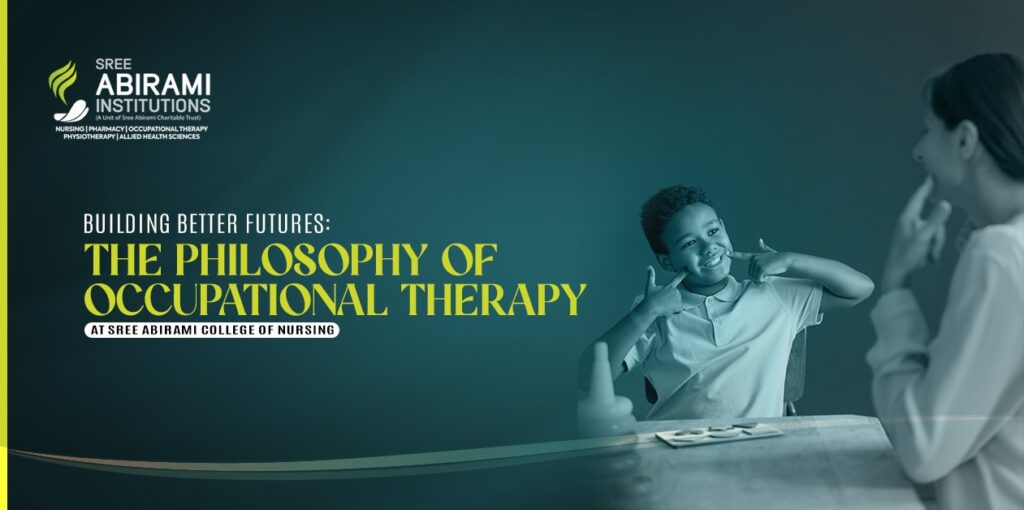
Building Better Futures: The Philosophy of Occupational Therapy at Sree Abirami College
A Vision Beyond Healing
Occupational therapy (OT) is more than a health career; it is the journey to empowerment and a quality life. At Sree Abirami College of Occupational Therapy, the philosophy of this profession is rooted in commitment through patient-centered care for the betterment of life. It is beyond the curing of symptoms but independence, renewed self-confidence, and an added meaning to life.
The Core Philosophy of Occupational Therapy
Occupational therapy practices are based on the belief that everyone deserves a meaningful life, even with physical, mental, or emotional challenges. Occupational therapists help people engage in meaningful occupations, hence improving their well-being. These could include daily self-care, dressing, eating, returning to work, managing a household, or participating in community life.
The same is not taught but followed at Sree Abirami College. The care here is developed holistically. Rather than looking at the person with a particular disease or disability, care for the whole individual is followed. This holistic approach provides personalized interventions by therapists, allowing the patient to meet specific goals.
Empowering Lives Through Personalized Care
Individual-Centered Approach
The second fundamental basis of occupational therapy at Sree Abirami College is that the intervention is individualized. Everybody is different, with specific difficulties and aspirations. Training in occupational therapy prepares people to understand the patient’s needs, choices, and capabilities. In this manner, they can devise and execute interventions that help improve the individual’s deficits and existing capacities.
For instance, a stroke survivor may require some support to regain basic motor skills. Another person diagnosed with mental illness may need help to manage anxiety or depression. In all these cases, however, therapists are concerned about their ability to regain the independence and meaningful lives of the patient.
Role of Occupations in Healing
The philosophy of occupational therapy differs from the others, focusing on the idea that meaningful activities support healing. We are taught in Sree Abirami College to think of this concept in new ways. We learn about the “occupations” that each person is most interested in, be it cooking, gardening, working, or socializing, and work with those activities as therapeutic interventions.
Recovery and rehabilitation become interesting when the patient is encouraged to do things he likes or that give him meaning. He regains lost skills, improves his emotional well-being, and begins to regain his sense of accomplishment and hope.
Promotion of Autonomy and Well-being: A Holistic View of Health
Occupational therapy at Sree Abirami College is conceptualized on a holistic view of health, where mental, emotional, and physical health are interconnected. The curriculum teaches that independence and well-being are best achieved by promoting all dimensions of life and not merely by eliminating physical barriers.
This integrative approach can be reflected in how practitioners work with their clients. For example, someone may be working with a client who physically doesn’t have an appropriate, functioning limb yet would pay attention to how this condition impacted them emotionally. Therefore, occupational therapy is valid as a therapeutic occupation meant to restore the individual to a quality life.
Advocating for Improved Inclusion in Community
Community reintegration is another essential feature of the philosophy of occupational therapy at Sree Abirami College. Therapists train their patients to regain independence and be readmitted into society. This is usually when a patient can return to work, volunteer, or resume other social activities.
Occupational therapy emphasizes reintegration, giving the person control over his life to help him contribute positively to society. The patient needs this impetus since illness likely alienates them from the community. Involving the community can enable them to reclaim their position and meaning in life.
Occupational Therapy: A Dynamic, Evolving Field
Innovation in Occupational Therapy Education
Sree Abirami College is a leader in occupational therapy education innovation. The curriculum continues to change, incorporating the latest research and techniques students need to prepare for the fast-changing health landscape.
This makes them think more creatively about therapeutic techniques and developing new interventions that may deal with new challenges in health issues. From introducing technology in therapy to finding new interventions for health challenges, this college ensures that students get tools that help them become leaders in their professions.
The Future of Occupational Therapy
With much potential in the future for occupational therapy, Sree Abirami College is shaping its horizons. With the rapidly growing population and the enhanced need for mental health and rehabilitation, the necessity of having skilled occupational therapists continues to grow.
The college’s philosophy guarantees that the graduates will be accomplished clinicians and sensitive advocates for their patients. They are adequately prepared to work in any setting, from hospitals and rehabilitation centers to schools, workplaces, and community organizations.
Conclusion: Shaping Brighter Futures
The philosophy of Sree Abirami College of Occupational Therapy is simple but profound: helping individuals recover their independence, dignity, and joy through meaningful occupations. Considering the whole person and using occupations as a vehicle for healing puts the college in a perfect position to empower students and their patients to develop a better future.
The power of occupational therapy is transformative, and Sree Abirami College shines as a beacon of hope, bringing growth, learning, and healing to every individual.